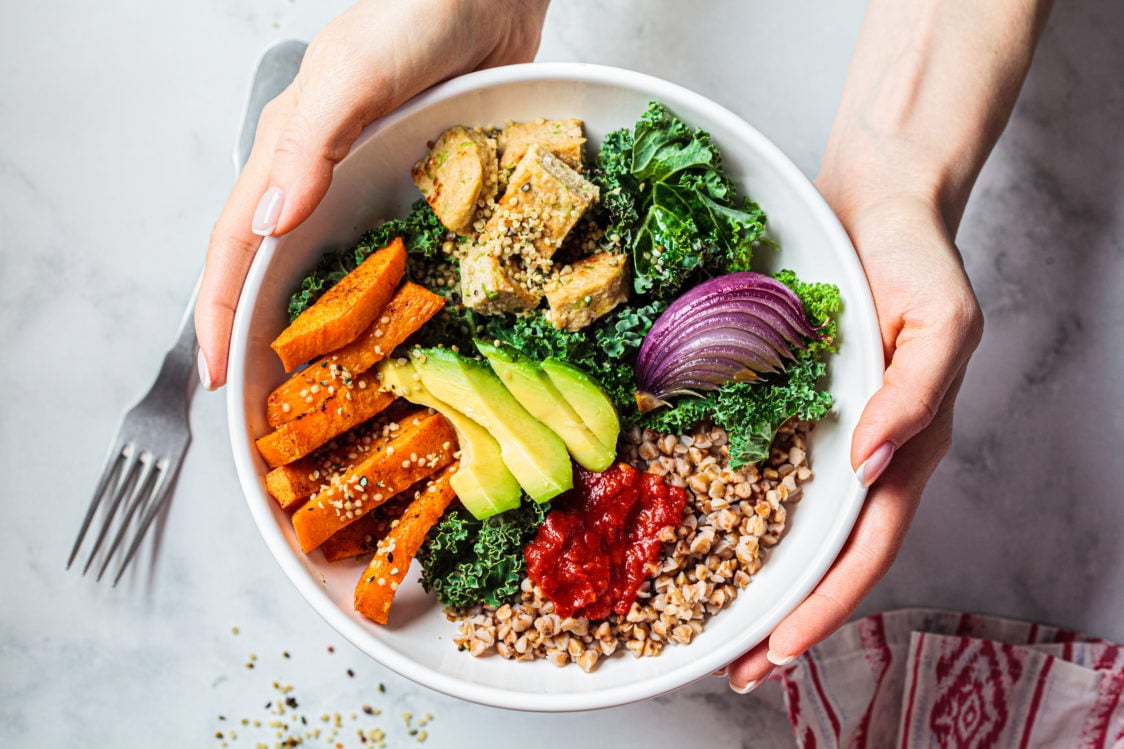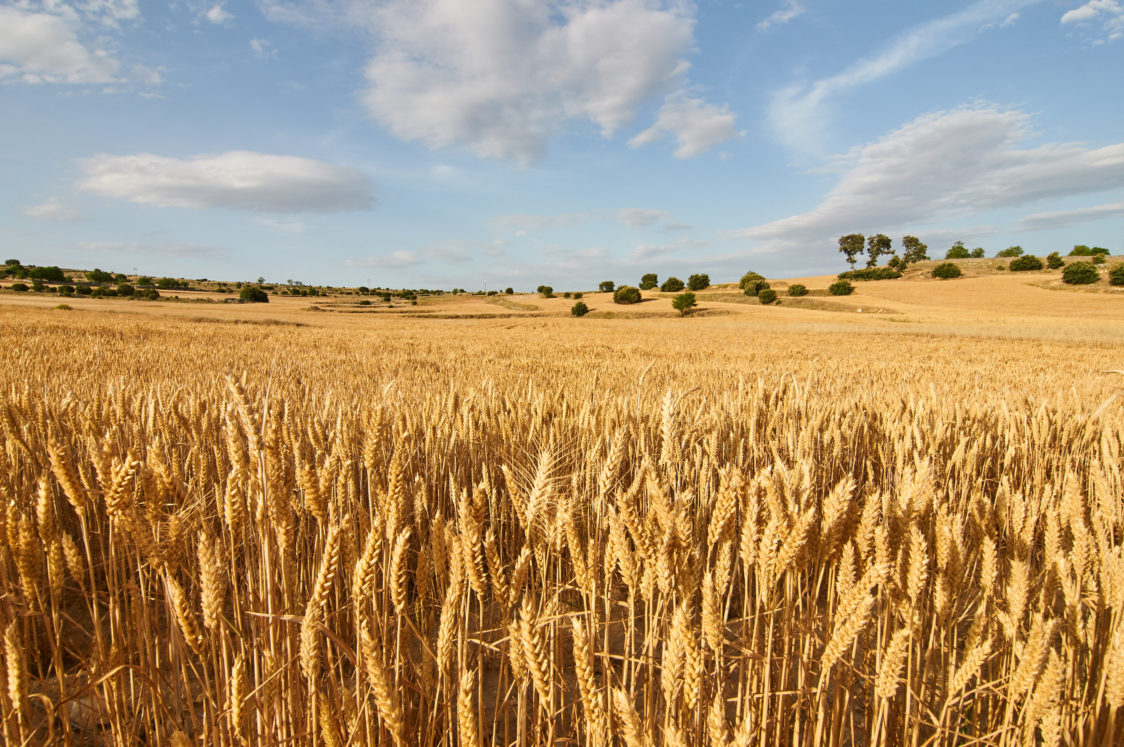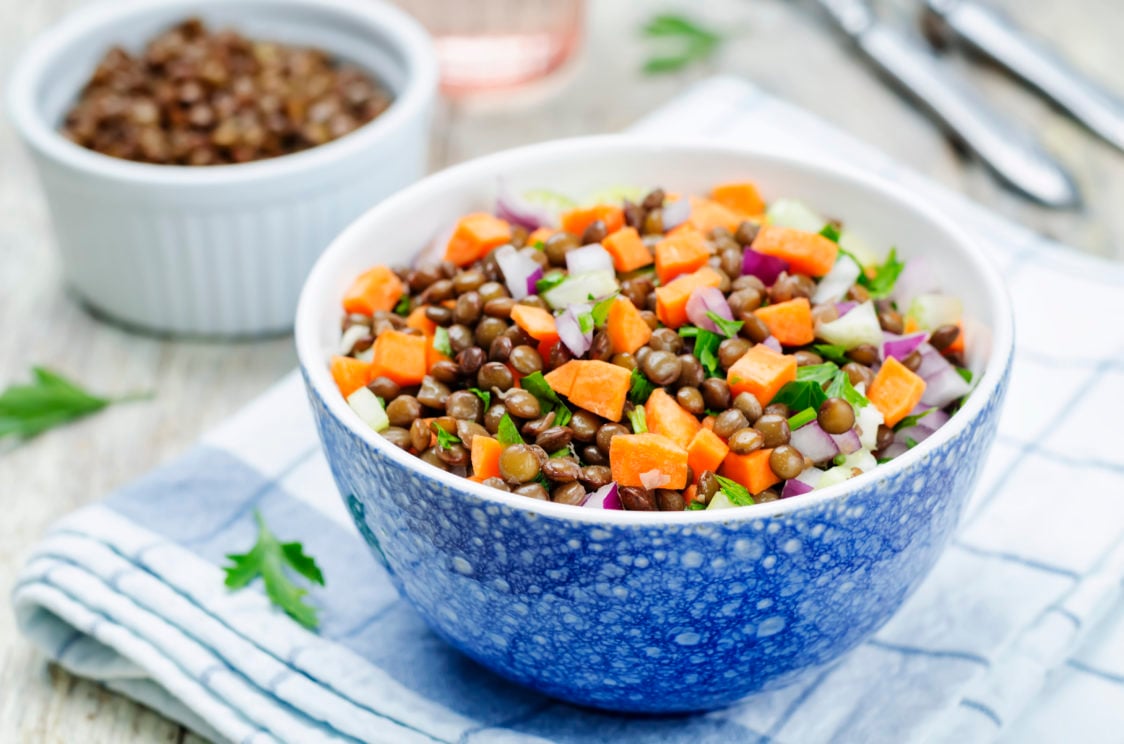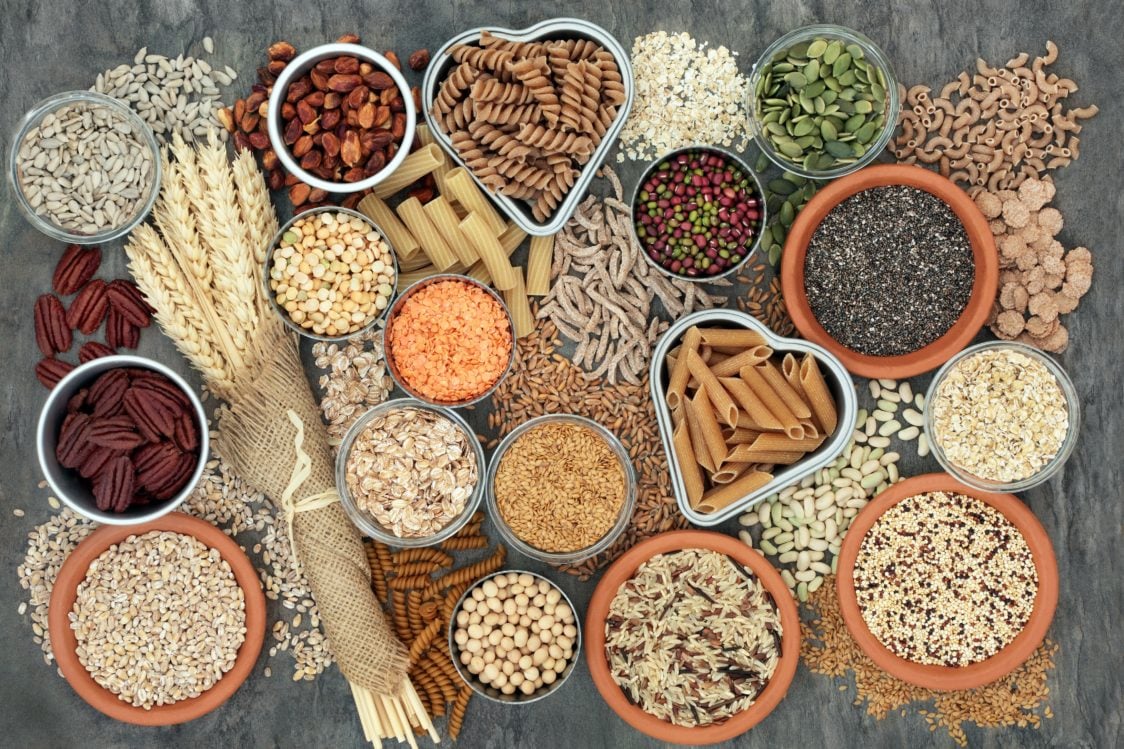Table of Contents
Vegetarianism divides people into two groups. In the first group are those who consider it the healthiest way of eating, while the other group believes that this way of eating goes hand in hand with health problems. The interesting thing is that both of these groups are partly right. With a vegetarian diet, it can really happen that you might lack, for example, some vitamins, which will in turn increase the risk of health issues. At the same time, a properly designed vegetarian diet can benefit your health. Well then, looking at this from a scientific point of view, what are the advantages and disadvantages of adopting a vegetarian diet?
In the article, you can read more about the benefits of vegetarianism on:
In the article, you can read more about the disadvantages of vegetarianism on:
What is vegetarianism, and who is a vegetarian?
What are the types of vegetarian diets?
- Semi-vegetarianism (flexitarianism) – This is the least strict form of vegetarianism. Semi-vegetarians do not completely exclude animal foods, including meat, from their diet, but consume them in limited quantities.
- Pescetarianism – After semi-vegetarianism, this is the second least restrictive form of vegetarianism. Pescatarians do not consume meat, but include fish, eggs, and dairy products in their diet.
- Lacto-ovo vegetarianism – People who follow this diet eliminate meat and fish, but include eggs and dairy products. This is the most common form of vegetarianism.
- Ovo-vegetarianism – In this case, the overall diet is significantly more limited. Ovo-vegetarians consume just eggs from among animal foods and exclude not only meat and fish, but also dairy products.
- Lacto-vegetarianism – People following this type of vegetarianism consume dairy products, but exclude meat, fish, and eggs from their diet.
- Veganism – A vegan’s diet does not contain any animal products. [28]
- RAW diet (veganism) – In this case, not only all animal products, but also all foods processed above a temperature of 48 °C are excluded from the diet. RAW diet thus mainly comprises raw foods such as vegetables, fruits, nuts, seeds, sprouted legumes and cereals. [34]
- Fruitarianism – In the diet of a fruitarian, you will find nothing but fruit, or nuts and seeds.

Is a vegetarian diet healthy?

What are the advantages of a vegetarian diet?
There are various benefits and risks associated with different types of vegetarianism based on the foods consumed. Today, we will primarily focus on the most prevalent form, which is lacto-ovo vegetarianism. A well-planned and diverse lacto-ovo vegetarian diet can offer several health benefits.
1. Lower risk of cardiovascular diseases
Several studies have consistently shown that a vegetarian diet can have a beneficial impact on our cardiovascular health, and is associated with a reduced risk of heart and blood vessel diseases. Notably, the EPIC Oxford Study, which tracked the health status of 65,000 individuals over multiple years, revealed that after 18 years of follow-up, vegetarians had a 23% lower incidence of ischaemic heart disease (a condition where the heart muscle does not receive adequate blood supply) compared to those who consumed meat. [14,22]
This is because the nutrient composition of a vegetarian diet can contribute to controlling several key indicators of heart health. For instance, it can help maintain optimal blood cholesterol levels, blood pressure, and body weight. [16]

How does vegetarianism affect cardiovascular health?
- Vegetarianism helps maintain an optimal body weight, which is important for maintaining a healthy and efficient heart function. Thanks to the predominance of plant-based foods, a well-designed vegetarian diet contains plenty of dietary fibre, which helps satiate better and thus reduces the amount of food consumed. Dietary fibre is found in whole grain products, legumes, vegetables, fruits, nuts, and seeds. [25]
- Vegetarians also tend to have better control over their blood sugar levels (glycaemia), which can be attributed to the effect of dietary fibre. This fibre slows down the absorption of sugar into the bloodstream, thereby preventing spikes in blood sugar levels. Additionally, this nutrient can aid in reducing cholesterol levels as well. [25]
- Typically, vegetarians exhibit lower cholesterol levels due to their reduced consumption of animal fats and a comparatively higher intake of vegetable fats, such as those found in nuts, seeds, and vegetable oils. These plant-based fats contain the beneficial monounsaturated (MUFA) and polyunsaturated (PUFA) fatty acids that contribute to lower levels of cholesterol in the body.
- Plant foods are also abundant in vitamins and bioactive compounds with antioxidant properties, which can offer increased protection against vascular damage.
2. Reduced risk of developing type 2 diabetes
Type 2 diabetes, also known as type 2 diabetes mellitus, is frequently associated with elevated blood pressure, obesity, or unhealthy lipid levels in the blood, collectively referred to as the metabolic syndrome. Similar to its potential to mitigate high blood pressure or regulate blood cholesterol levels, a vegetarian diet may potentially lower the risk of developing type 2 diabetes or help manage the condition if it is already present. The aforementioned EPIC Oxford Study demonstrated that vegetarians had a 35% lower risk of developing type 2 diabetes than those following a standard diet. [10,15,31]
How does vegetarianism affect the risk of developing type 2 diabetes?
- Vegetarians typically have a healthy body weight, which is also associated with a lower risk of developing type 2 diabetes. This is because it contributes to better insulin sensitivity, which can thus perform its role undisturbed and maintain healthy blood sugar levels (glycaemia). [14,15]
- Vegetarians also have more stable blood sugar levels thanks to dietary fibre (in vegetables, whole grains and other plant foods). This is because dietary fibre slows down the absorption of sugar into the bloodstream and helps maintain lower blood sugar levels after a meal. [19]
- Moreover, a vegetarian diet containing only a small amount of refined carbohydrates and sources of simple sugar also helps in achieving optimal blood sugar levels.

3. Related to a lower incidence of cancer
The EPIC Oxford Study suggests that following a vegetarian diet may also lower the risk of developing cancer. According to the study, vegetarians had a 10% lower risk of developing any type of cancer compared to people who regularly ate meat. Additionally, the study found a significant reduction in the risk of digestive tract tumours among vegetarians. Moreover, vegetarians had a 62% lower risk of developing stomach cancer and a 25% lower risk of developing colon cancer compared to meat eaters. [12,16,31]
How does vegetarianism affect the incidence of cancer?
- Evidence suggests that a high-fibre diet may help to protect against colon cancer. Fibre has the ability to bind with harmful and potentially carcinogenic substances that are ingested through food or formed during metabolism, thereby preventing their absorption and action on the walls of the digestive tract. As a result, diets that are rich in whole grain products, legumes, vegetables, and fruits are considered beneficial for colon health. [17]
- A vegetarian diet may provide protection for the intestinal wall due to its high content of soluble fibre, which is primarily found in fruits and vegetables. Soluble fibre acts as a prebiotic, serving as a food source for beneficial bacteria in the large intestine. These bacteria are then able to produce substances such as short-chain fatty acids, which can nourish the cells of the intestinal mucosa. [17]
- Vitamins and other substances with antioxidant properties, which are abundant in plant-based diets, can help protect against oxidative stress. Antioxidants work by neutralizing free radicals, which are known to contribute to the development of cancer. [12]
- The exclusion of meat and meat products from one’s diet may also help protect against cancer. Consumption of red meat, particularly processed meat, is considered a risk factor for the development of certain tumours. Among industrially processed meat products, sausages, salami, and similar products pose the greatest risk. According to a study, eating 50 g of processed meat per day increases the risk of colorectal cancer by 18% and colon cancer by 23%. However, a balanced diet that includes other healthy foods can help offset this risk. For instance, consuming 90 g of whole grains per day has been linked to a 17% lower risk of colorectal cancer and an 18% lower risk of colon cancer. [16,17,27]

4. Helps with weight loss and maintaining optimal body weight
A vegetarian diet is likely to be linked to lower body weight and a lower BMI (Body Mass Index). A study of almost 40,000 women found that the prevalence of overweight and obesity was 40% among those who consumed a mixed diet, but only 25% among those on a vegetarian diet (specifically lacto-ovo vegetarian diet). Additionally, it seems that a vegetarian diet could be effective for targeted weight loss. [11,18]
How can going vegan help with losing weight or maintaining optimal body weight?
- Plant-based foods containing fibre have the ability to create a feeling of fullness, which can help reduce portion sizes and overall calorie intake. These foods include vegetables, fruits, whole grains, legumes, as well as nuts and seeds.
- Fibre also helps slow down the absorption of sugar and fat from the digestive tract into the bloodstream. [11]
- A vegetarian diet typically contains lower amounts of animal fat, making it a potentially less caloric option compared to diets that include meat.
- A well-planned vegetarian diet should consist of a variety of foods that have a relatively low energy value, which can help promote satiety and prevent hunger. These foods are referred to as having low energy density and include vegetables and fruits, among others.
However, it is still true that weight loss can only be achieved when the body is in a calorie deficit. Therefore, if a vegetarian diet is too high in calories, simply following a vegetarian diet will not lead to weight loss.
You might be interested in these products:
5. It is more environmentally friendly
The motivation to switch to a vegetarian diet is not always driven by its health benefits, but rather its advantages in terms of its impact on the environment. This is because the production and processing of plant-based foods is more sustainable and eco-friendly compared to animal-based production.
What is the connection between nutrition and the environment?
- Greenhouse gas emissions generated by animal production are its most commonly mentioned negative impact. Increasing their concentration in the atmosphere accelerates global warming. In the European Union, up to 17% of total emissions come from animal production. For comparison, this represents a greater amount of emissions per year than all cars and vans in the EU combined (data from 2018). [29]
- Globally, animal production accounts for 72 – 78% of all emissions coming from agriculture. [24]
- Animal production also utilizes a massive amount of global land. It even accounts for up to 71% of the total agricultural area. Such high consumption goes hand in hand with deforestation, as forests are being replaced by fields of crops used as feed for livestock. [29]
- Despite the fact that the production of animal food generates such a large amount of emissions and uses a significant amount of land, animal-based foods provide only 18% of the total energy intake to the human population. The rest of the energy comes from plant-based food. [21]
Unlike animal production, plant-based production is more environmentally friendly. For example, the production of plant-based food intended for human consumption (not as feed for farm animals) accounts for only about one-third of emissions compared to animal production. [24]
A shift towards a diet with a higher content of plant-based foods can have positive environmental impacts. In one study, scientists estimated that if the diet of the world’s population changed and was based primarily on plant-based foods, greenhouse gas emissions from agriculture could be reduced by up to 56%. Moreover, it is likely that we will have to change and streamline our eating habits sooner or later. The world’s population is still growing, and it will be important to figure out how to feed such a large mass of people. To this end, initiatives such as the Planetary Health Diet have been developed, which proposes such a dietary approach. [24,32,33]

6. It is more sensitive to animals
Similarly to the environmental impact mentioned earlier, the ethical and moral aspect of vegetarianism can also be a strong argument for many to switch to a plant-based diet. Many vegetarians reject the current methods of animal farming and the practices that go into producing animal-based foods. Animals evidently feel pain, stress, and fear, and therefore, many consider it unethical for them to be subjected to insensitive or even cruel treatment.
Moral and environmental arguments are frequently intertwined and appear to be the most compelling motivators for transitioning to a vegetarian lifestyle. It turns out that individuals who adopt vegetarianism based on these convictions are the most committed to sustaining a plant-based diet in the long run. [9]

What are the disadvantages of a vegetarian diet?
While vegetarianism offers many benefits, it also poses certain risks, particularly related to health. Eliminating entire food groups from the diet can lead to a deficiency in important nutrients, and the stricter the vegetarian diet, the higher the risks of nutrient deficiencies. What are the potential health and other disadvantages of adopting a vegetarian diet?
1. It can lead to a deficiency in essential nutrients
Certain nutrients are more abundant in animal-based foods, or are more easily absorbed from those sources. As a result, every vegetarian should be aware of which nutrients may be lacking in their diet and how to properly supplement them. Which nutrients are commonly deficient in a vegetarian diet?
1. Omega-3 fatty acids (Omega-3 FA)
Omega-3 fatty acids are essential polyunsaturated fatty acids that play a critical role in supporting the proper function of the heart, brain, and eyes. While some types of omega-3 fatty acids can be synthesized by the body, others must be obtained through the diet. [30]
Where to find omega-3 fatty acids?
Alpha-linolenic acid (ALA) is an essential omega-3 fatty acid that plays a crucial role in maintaining optimal blood cholesterol levels. Since the human body cannot produce ALA, it must be supplemented through diet. Good dietary sources of ALA include flaxseeds, flaxseed oil, soybean oil, walnuts, and chia seeds.
ALA is then transformed into EPA and DHA fatty acids in our bodies, which are essential for brain and heart health. However, the transformation of ALA is not sufficient – only about 5% is converted to EPA and 0.5% to DHA. Therefore, it’s important to also obtain EPA and DHA from the diet. This can be challenging for many vegetarians, as fatty fish (such as salmon, mackerel, herring, etc.) — which are the richest sources of these omega-3 fatty acids – are often excluded from their diet. [4,7,30]

How can a vegetarian get enough omega-3 fatty acids?
For vegetarians who don’t eat fatty fish, meeting the recommended daily intake of EPA and DHA can be quite challenging. Therefore, it’s important to focus on regularly incorporating plant-based food sources that contain alpha-linolenic acid, which is converted into EPA and DHA in the body. However, since the conversion rate is quite low, supplementing with omega-3 in the form of a dietary supplement may be necessary. Another option is to consume vegan products made from seaweed, which can provide sufficient amounts of omega-3 and ensure that it’s not left to chance.
If you want to learn more about the appropriate amount of healthy fats to include in your diet, you can read the article: How Much Healthy Fat Should You Eat? The Amount of Omega-3 Is More Important Than Their Ratio to Omega-6.
2. Iron
Iron is crucial for the proper functioning of the body as it plays a vital role in energy production, oxygen transport, formation of red blood cells, and immune system function. Therefore, neglecting sufficient intake of iron can have adverse effects on health. [30]
Where to find iron?
Iron is a mineral found in many foods, both of animal and plant origin. As you can see in the following tables, plant-based foods actually contain higher levels of iron than animal-based ones.
| Food | Iron content (100 g) |
| lentils | 13 mg |
| oat flakes | 4.3 mg |
| cashew nuts | 6 mg |
| almonds | 3.7 mg |
| Food | Iron content (100 g) |
| egg yolk | 2.7 mg |
| beef | 2.2 mg |
| pork | 0.9 mg |
| cod liver |
So how is it possible that vegetarians may lack iron? It’s related to its absorbability. Plant-based foods contain so-called non-heme iron, which is absorbed from the digestive tract to a lesser extent than heme iron from animal foods. While we absorb 5-12% of iron from plant-based foods, we can obtain 15-35% of its content from animal-based ones. From 50 grams of lentils (a typical serving in raw form), we intake approximately 0.4 – 0.8 mg of iron, which is the amount we can get from eating just one egg yolk. As you can see, it is simply easier to obtain iron from animal foods. [2,13]
How can a vegetarian get enough iron?
Adequate iron intake is not an impossible task for vegetarians to achieve. However, they should be aware of the lower absorption of iron from plant-based foods and balance it with a higher intake of iron-rich foods. For example, lentils, which contain a significant amount of non-heme iron, become a better source when included more frequently and in larger portions in the diet.
How to improve the absorption of plant-based non-heme iron?
- The absorption of iron is supported by combining it with vitamin C. Therefore, it is recommended to eat foods rich in non-heme iron together with sources of vitamin C, such as peppers, leafy vegetables (broccoli, cauliflower, etc.), citrus fruits, or berries. [5,26]
- Combining iron with animal protein can also enhance its absorption. Therefore, vegetarians can boost the absorption of iron from plant-based sources by adding foods such as eggs or dairy products. [5]
- On the other hand, there are factors that can reduce the absorption of non-heme iron. These include phytates in whole-grain products, calcium, and polyphenols in beverages such as coffee and tea. [5]
Since various substances in food can alter the absorption of iron and thereby affect its intake, it is important for vegetarians to closely monitor their iron levels in the body. If they turn out to be insufficient and difficult to achieve through dietary changes, it is advisable to consider taking dietary supplements.

3. Zinc
Zinc participates in many processes in the body. It is involved, for example, in DNA synthesis and is a part of carbohydrate, fat, and protein metabolism. At the same time, it is necessary for the health of bones, hair, and skin, and contributes to the function of the immune system, eyesight, and other bodily functions. [30]
Where to find zinc?
Animal foods such as meat, eggs, and fish are rich in zinc. However, plant-based foods are also a good source of this mineral. We can find it in legumes, grains, nuts, and seeds. [6,16]
| Zinc content (100g) | |
| lentils | 3.3 mg |
| almonds | 3.12 mg |
| buckwheat | 2.4 mg |
| natural rice | 2.1 mg |
| Food | Zinc content (100g) |
| beef (raw) | 4.2 mg |
| eggs | 1.3 mg |
Getting enough zinc as a vegetarian poses a similar challenge as with iron, as zinc from plant-based foods is less bioavailable than from animal sources. This is due to phytates in plant foods, which inhibit zinc absorption. However, soaking or sprouting plant foods can help to reduce the negative effects of phytates on zinc absorption. [6]
How can vegetarians ensure sufficient zinc intake?
Vegetarians can obtain zinc from sources such as eggs, legumes, grains, nuts, and seeds. Zinc absorption can be improved by sprouting grains, legumes, or seeds, which not only increases zinc intake but also adds variety to the diet. If these sources cannot meet the body’s zinc requirements, it is recommended to reach for dietary supplements.
If you would like to learn more about zinc, you can read our article: Zinc: What Is It Good For, What Causes a Deficiency, and What Are the Best Sources?

4. Vitamin D
Vitamin D is a fat-soluble vitamin that is essential for our bones, teeth, and muscles. It is also important for the function of the immune system and for cell growth and division. [30]
Where to find vitamin D?
The body produces this vitamin through the action of sunlight. However, due to seasonal changes and only a few sunny months, we cannot rely entirely on this source, and thus we need to supply vitamin D through diet. Fatty fish, organ meats, and egg yolks are the richest sources of vitamin D. From plant-based foods, it can be found in mushrooms, where it is produced by UVB radiation. [3]
How can vegetarians get enough of vitamin D?
The list of foods rich in vitamin D is relatively short, and moreover, the best sources are of animal origin. Vegetarians can obtain it from eggs or some types of fish. However, even for someone who regularly consumes all animal foods, it is quite challenging to meet the recommended daily intake of vitamin D. For vegetarians, it is even more difficult. Therefore, it is advisable to focus on supplementing vitamin D in the form of vegetarian-friendly dietary supplements. However, it does not hurt to first have your vitamin D levels checked, which will tell you whether you really need supplementation. [16]
You can read more about vitamin D in our article: Vitamin D: Why Is It So Important, What Causes Deficiency, and How to Supplement It?

5. Vitamin B12
Vitamin B12 (cobalamin) is essential for the proper functioning of the nervous system, the production of red blood cells, DNA, and the immune system. This nutrient is primarily present in animal foods. Common plant-based foods like grains, legumes, or vegetables do not contain it. Consequently, vegans, who do not consume any animal products in their diet, are at risk of developing its deficiency, which makes supplementation of vitamin B12 crucial for them. [23,30]
Where to find vitamin B12?
The main sources of this vitamin are animal products, such as meat, fish, organ meats, eggs, and dairy products. However, certain amounts can also be found in fermented foods because vitamin B12 is produced by bacteria. It is also found in seaweed or mushrooms grown in soil with a high content of this vitamin. However, the absorbability and availability of vitamin B12 from plant-based foods are still unclear, so they cannot be relied upon as a quality source of vitamin B12.
How can vegetarians get enough of vitamin B12?
Lacto-ovo vegetarians must rely on the intake of this vitamin from dairy products and eggs. However, deficiency can also occur in them, so it may be beneficial for them to take vitamin B12 in the form of a dietary supplement. [20]

2. Vegetarian diet can complicate social life
You may have noticed that people who do not consume meat or other animal products often face raised eyebrows or unpleasant comments from people around. Family, friends, or colleagues may not understand why someone in their circle has decided to become a vegetarian. Alternatively, they may understand but disagree with this way of life. This can cause conflicts not only at the dinner table, but also in other social settings.
Vegetarians may also face the challenge of choosing their meals in restaurants or social events. The habit of regularly consuming meat and considering it to be the basis of a quality meal is deeply rooted in our society, which is evident in many restaurant menus.
That said, over time, there has been some progress made, and today it is easier than ever to find a restaurant nearby that offers delicious vegetarian dishes. Awareness of plant-based diets and their potential benefits is also more widespread, which is a good step towards acceptance of someone who chooses to become a vegetarian.

3. It may lead to a higher intake of processed foods
If a vegetarian diet is not properly planned, it can easily become filled with inappropriate foods. As mentioned earlier, not all vegetarian-friendly foods are suitable for daily consumption.
The label “vegetarian” can be deceptive as it may include various sweets, pastries, fried foods, fast food, and sweetened beverages that are highly industrially processed and contain high amounts of sugar and fat while lacking in essential micronutrients and fibre. Consuming these foods regularly can give the false impression that it is acceptable in a vegetarian diet. However, these foods should be limited in your diet, regardless of whether you are vegetarian or not.
While we are aware that we should not consume these foods in excess, highly processed foods also include various products made specifically for vegetarians, such as plant-based “cutlets”, “sausages”, and other meat alternatives. Even though these products are marketed towards vegetarians, they are not ideal for daily consumption due to their high salt, preservative, and additive content. Thus, it is best to limit their intake and only include them occasionally to add variety to a vegetarian’s diet. [8]
For a healthy vegetarian diet, it is essential to focus on staple foods such as grains, legumes, vegetables, and fruits, and include the portion of animal-based foods that aligns with the specific form of vegetarianism. By doing so, a vegetarian diet can provide all the essential nutrients needed for good health and prevent nutrient deficiencies.
You can read more about vegetarian-friendly foods in the article: Plant-based alternatives to meat: Plant-Based Meat Alternatives: Which Are the Best, How Much Protein Do They Contain, and Can They Fully Replace Meat?

4. Sometimes you can’t do without dietary supplements
As mentioned earlier, a vegetarian diet can result in deficiencies in certain nutrients. The more foods a vegetarian eliminates, the greater the risk of missing out on essential nutrients. For this reason, every vegetarian should be aware of the nutrients they may be missing by excluding certain foods. Despite their efforts to maintain a varied and balanced diet, taking dietary supplements may still be necessary.
One should not take micronutrient deficiencies lightly, as they can lead to various health complications. Vegetarians should therefore be aware that in order to maintain good health, it is advisable to regularly have blood tests done and, if necessary, supplement nutrients not only through diet, but also with dietary supplements.

What distinguishes different forms of vegetarianism from one another?
Each form of vegetarianism carries the risk of nutrient deficiencies simply because certain food groups are restricted from the diet for an extended period of time. Even lacto-ovo vegetarianism, which we have discussed so far, is not without risks despite being one of the less strict forms of this dietary approach. However, as the number of excluded foods increases, so do the risks of nutritional deficits.
- Vegans run the highest risk of nutrient deficiencies. Since they don’t consume any animal products, it’s virtually impossible for them to get enough vitamin B12 in their diet without supplementation. A greater problem may also arise in their intake of previously mentioned vitamin D, iron, zinc, and omega-3 fatty acids. In addition to these, there is also a risk of calcium, iodine, and protein deficiency. If you are interested in learning more on the topic of veganism and its pitfalls, then read our next article: What Nutrients Vegans Lack the Most Often and How to Supplement Them?
- Ovo-vegetarians, who include eggs in their diet but exclude other animal products, may also lack calcium in addition to the nutrients mentioned earlier. This is because their best source of calcium, which is dairy products, is not included in their diet.
- On the contrary, lacto-vegetarians who do not consume eggs may have a harder time obtaining vitamin D from their diet.

Is a vegetarian diet healthier than a regular omnivorous diet?
Overall, it could be said that vegetarianism can be healthier than a regular diet that includes meat. However, a balanced diet that includes all food groups can also have benefits on health. In both cases, it is possible to create a proper meal plan that provides many health benefits. On the other hand, it is also easy to create a diet that is full of unhealthy, processed foods.
That being said, when it comes down to a properly balanced vegetarian and a regular omnivorous diet, neither one is superior to the other. Both can provide health benefits. Ultimately, it’s up to you to decide which one suits you better and which one you choose to follow.
What are the main takeaways?
Vegetarianism is becoming increasingly popular, and for very good reasons. It has been shown to have significant health benefits, such as being a good prevention for cardiovascular and cancerous diseases, and it can also help maintain a healthy body weight. Additionally, it is more environmentally friendly. That said, like any alternative dietary lifestyle that excludes certain food groups, vegetarianism also poses risks due to the possible deficiency of certain nutrients. Vegetarians should therefore ensure that their diet is diverse and nutritionally balanced, and supplement their diet with high-quality nutrition or supplements if necessary to prevent nutritional deficits.
[1] CLEM, J. - BARTHEL, B. A Look at Plant-Based Diets. – https://www.ncbi.nlm.nih.gov/pmc/articles/PMC8210981/
[2] DUYFF, R.L. Complete Food & Nutrition Guide. . New York: Academy of Nutrition and Dietetics, 2017. ISBN 978-0-544-52058-5.
[3] EFSA PANEL ON DIETETIC PRODUCTS, NUTRITION AND ALLERGIES (NDA) Dietary reference values for vitamin D. – https://onlinelibrary.wiley.com/doi/abs/10.2903/j.efsa.2016.4547
[4] EFSA PANEL ON DIETETIC PRODUCTS, NUTRITION, AND ALLERGIES (NDA) Scientific Opinion on Dietary Reference Values for fats, including saturated fatty acids, polyunsaturated fatty acids, monounsaturated fatty acids, trans fatty acids, and cholesterol. – https://onlinelibrary.wiley.com/doi/abs/10.2903/j.efsa.2010.1461
[5] EFSA PANEL ON DIETETIC PRODUCTS, NUTRITION AND ALLERGIES (NDA) Scientific Opinion on Dietary Reference Values for iron. – https://onlinelibrary.wiley.com/doi/abs/10.2903/j.efsa.2015.4254
[6] EFSA PANEL ON DIETETIC PRODUCTS, NUTRITION AND ALLERGIES (NDA) Scientific Opinion on Dietary Reference Values for zinc. – https://onlinelibrary.wiley.com/doi/abs/10.2903/j.efsa.2014.3844
[7] FOOD AND AGRICULTURE ORGANIZATION OF THE UNITED NATIONSEd. Fats and fatty acids in human nutrition: report of an expert consultation: 10-14 November 2008, Geneva. – https://agris.fao.org/agris-search/search.do?recordID=XF2016049106
[8] GEHRING, J. et al. Consumption of Ultra-Processed Foods by Pesco-Vegetarians, Vegetarians, and Vegans: Associations with Duration and Age at Diet Initiation. – https://linkinghub.elsevier.com/retrieve/pii/S0022316622000037
[9] HARGREAVES, S.M. et al. Vegetarian Diet: An Overview through the Perspective of Quality of Life Domains. – https://www.ncbi.nlm.nih.gov/pmc/articles/PMC8069426/
[10] HUANG, P.L. A comprehensive definition for metabolic syndrome.– https://www.ncbi.nlm.nih.gov/pmc/articles/PMC2675814/
[11] HUANG, R.-Y. et al. Vegetarian Diets and Weight Reduction: a Meta-Analysis of Randomized Controlled Trials.– https://pubmed.ncbi.nlm.nih.gov/26138004/
[12] HUANG, T. et al. Cardiovascular Disease Mortality and Cancer Incidence in Vegetarians: A Meta-Analysis and Systematic Review. – https://www.karger.com/Article/FullText/337301
[13] HURRELL, R. - EGLI, I. Iron bioavailability and dietary reference values. – https://pubmed.ncbi.nlm.nih.gov/20200263/
[14] KEY, T.J. et al. Plant-based diets and long-term health: findings from the EPIC-Oxford study. – https://pubmed.ncbi.nlm.nih.gov/35934687/
[15] LEE, Y. - PARK, K. Adherence to a Vegetarian Diet and Diabetes Risk: A Systematic Review and Meta-Analysis of Observational Studies. – https://www.ncbi.nlm.nih.gov/pmc/articles/PMC5490582/
[16] MELINA, V. et al. Position of the Academy of Nutrition and Dietetics: Vegetarian Diets.– https://pubmed.ncbi.nlm.nih.gov/27886704/
[17] MYSURU SHIVANNA, L. - UROOJ, A. A Review on Dietary and Non-Dietary Risk Factors Associated with Gastrointestinal Cancer. – https://pubmed.ncbi.nlm.nih.gov/27270712/
[18] NEWBY, P. et al. Risk of overweight and obesity among semivegetarian, lactovegetarian, and vegan women – https://www.sciencedirect.com/science/article/pii/S0002916523277084
[19] OLFERT, M.D. - WATTICK, R.A. Vegetarian Diets and the Risk of Diabetes. – https://www.ncbi.nlm.nih.gov/pmc/articles/PMC6153574/
[20] PAWLAK, R. et al. How prevalent is vitamin B12 deficiency among vegetarians? – https://pubmed.ncbi.nlm.nih.gov/23356638/
[21] POORE, J. - NEMECEK, T. Reducing food’s environmental impacts through producers and consumers. – https://www.science.org/doi/10.1126/science.aaq0216
[22] QUEK, J. et al. The Association of Plant-Based Diet With Cardiovascular Disease and Mortality: A Meta-Analysis and Systematic Review of Prospect Cohort Studies. – https://www.ncbi.nlm.nih.gov/pmc/articles/PMC8604150/
[23] RIZZO, G. et al. Vitamin B12 among Vegetarians: Status, Assessment and Supplementation. – https://www.ncbi.nlm.nih.gov/pmc/articles/PMC5188422/
[24] SPRINGMANN, M. et al. Options for keeping the food system within environmental limits. – https://www.nature.com/articles/s41586-018-0594-0
[25] TRAUTWEIN, E.A. - MCKAY, S. The Role of Specific Components of a Plant-Based Diet in Management of Dyslipidemia and the Impact on Cardiovascular Risk. – https://www.ncbi.nlm.nih.gov/pmc/articles/PMC7551487/
[26] USDA FoodData Central. – https://ndb.nal.usda.gov/index.html
[27] VIEIRA, A.R. et al. Foods and beverages and colorectal cancer risk: a systematic review and meta-analysis of cohort studies, an update of the evidence of the WCRF-AICR Continuous Update Project. – https://pubmed.ncbi.nlm.nih.gov/28407090/
[28] WORLD HEALTH ORGANIZATION. REGIONAL OFFICE FOR EUROPE. – https://apps.who.int/iris/handle/10665/349086
[29] Animal farming in EU worse for climate than all cars. – https://www.greenpeace.org/eu-unit/issues/nature-food/45051/animal-farming-in-eu-worse-for-climate-than-all-cars
[30] EU Register of nutrition and health claims made on foods (v.3.6). – https://ec.europa.eu/food/safety/labelling_nutrition/claims/register/public/?event=search
[31] Plant-based diets and long-term health: findings from the EPIC-Oxford study | Proceedings of the Nutrition Society | Cambridge Core.– https://www.cambridge.org/core/journals/proceedings-of-the-nutrition-society/article/plantbased-diets-and-longterm-health-findings-from-the-epicoxford-study/771ED5439481A68AD92BF40E8B1EF7E6
[32] The 21st-century great food transformation. – https://www.thelancet.com/journals/lancet/article/PIIS0140-6736(18)33179-9/fulltext
[33] The Planetary Health Diet. – https://eatforum.org/eat-lancet-commission/the-planetary-health-diet-and-you
[34] Eleese Cunningham, RD - What is a raw foods diet and are there any risks or benefits associated with it? – https://www.jandonline.org/article/S0002-8223(04)01281-7/fulltext


Add a comment